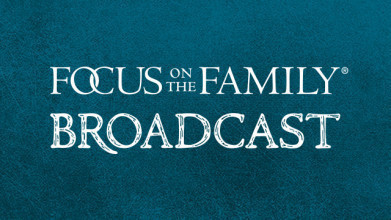Jim Daly: Shaunti, what is one thing a couple can do today to feel happier in their marriage?
Shaunti Feldhahn: When they’re hurt, believe the best in their spouse’s intentions.
John Fuller: Hm. So don’t make any assumptions about their motives?
Shaunti: Bad assumptions …
John: Ah.
Shaunti: … about their motives.
John: That’s some great advice, and you’ll hear more from Shaunti Feldhahn on our broadcast today, with Jim Daly. This is Focus on the Family, I’m John Fuller, and Jim, this should be a fun program.
Jim: Well, fun but enlightening. Uh. You know, sometimes, uh, we focus so much on the hard things in marriage. The holiness of marriage, and that’s critically important, uh, how it’s a refining process. I mention that all the time.
John: Yeah.
Jim: You know? How marriage is a refining process. The Lord is teaching us to be more selfless in that regard. But we gotta celebrate it as well, and we’re gonna do that today with a very special friend. And, uh, Shaunti, I wanna say welcome to Focus on the Family.
Shaunti: I’m always glad to be with you guys.
Jim: But also, I was reading your bio, I found this really interesting because, uh, you’re a Harvard grad, and that’s impressive. I bet your mom and dad were pretty happy, except paying the bills, may not have been too happy.
Shaunti: (laughs) Not so easy, exactly.
Jim: Um. That’s, yeah, that’s quite a-
Shaunti: I think it was 20 years before I paid off the student loans.
John: Oh, I’m sure.
Jim: Yeah, I’m sure, I’m sure it was. But in your bio, uh, it’s listed you served on the staff of the US Senate Banking Committee in the Federal Reserve Bank of New York.
Shaunti: Yep.
Jim: Now, how in the world with that background did you end up writing marriage books?
John: (laughs).
Jim: Is banking like marriage?
Shaunti: Y- yeah. Absolutely.
Jim: (laughs).
Shaunti: It’s all transactional.
John: Hm.
Shaunti: Right?
Jim: It’s all a transaction.
Shaunti: (laughs).
Jim: (laughs) Here’s a dollar, give me five dollars back.
Shaunti: Exactly.
Jim: Is that how it works?
Shaunti: Not really. Yeah. It’s actually really interesting, I had no idea that I would be doing this.
Jim: (laughs).
Shaunti: It’s amazing how God set me up, ’cause really I basically got this analytical training. That was my graduate degree, as an analyst, went and worked on Wall Street as a analyst. And I had no idea that when I was learning how to dig into the things under the surface, that one day I’d apply that to relationships.
Jim: It is amazing. God …
Shaunti: It’s, it’s a skillset.
Jim: … uh, twists and turns in the journey with Christ. I mean, that’s what’s wonderful. You’ve written this new book. Uh. Some have called it one of the best books if not the best book on marriage. That’s a big endorsement.
Shaunti: Yeah.
Jim: Uh. It’s titled the Surprising Secrets of Highly Happy Marriages. Let me challenge you on the title right out of the gate. Is happy marriage really the goal for us, as Christians?
Shaunti: You know what? Here’s I think the thing that we get into, is it’s so easy for us to say, “Well, our goal shouldn’t be to be happy, it should be to, like Gary Thomas’s book, to be holy,” right? And I once had a, um, a pastor that I really respected, and he’s done tons of marriage therapy. He said the problem with that is that we get to the idea that they’re mutually exclusive.
Jim: Mm-hmm.
Shaunti: And he said he has couples come to him all the time who think that they have two choices, which is break up and be happy or stay together and be miserable. He’s like, “Door number three…
Jim: Yeah.
Shaunti: …stay together and be happy.”
Jim: Why don’t we talk about that more often?
Shaunti: Well, I think it’s because in our culture, we have this knee-jerk reaction which is very understandable, against that idea that if I’m not happy, I’m out of here, right? Because people think, “Well, if I’m not, you know,” it shouldn’t be about that. The problem is I think we’ve gotten, especially maybe in the Christian community, into this idea of basically saying marriage it tough and it’s hard.
Jim: We’ll carry the burden.
Shaunti: And we’ll carry the burden. And, you know, yeah, absolutely. For some marriages, it is tough and it is hard.
Jim: And for some seasons.
Shaunti: And for some seasons. And that’s never an excuse to give up, it’s never an excuse to leave. But here’s what I realized as I started doing this research, is it is so easy to focus on our problems, to try to fix them. Problem, fix it, problem, fix it. You know, what’s the issue here? What’s getting in the way? And that means you’re only focusing on the problems. And-
Jim: Wait, uh, I want to say something before you move on.
Shaunti: Yes.
Jim: Because as a man, I’m relating to what you’re saying right now.
Shaunti: (laughs).
John: Yeah.
Jim: Because we’re problem solvers. You’re that …
Shaunti: Yeah.
Jim: … analytical mind. I like what you’re saying.
Shaunti: Well, here’s-
Jim: Do most women resonate with that, though?
Shaunti: They absolutely do. And you know why? Because one, one thing I always say when I realize this, I’m like, “Wait a minute. If I want to have a happy marriage, who do I look to?” Like, if I want to be more like Jesus, do I study the Pharisees?
Jim: I hope not.
John: Yeah.
Shaunti: (laughs) Or do I study Jesus?
John: Mm-hmm.
Shaunti: No, I actually study the one who I’m looking to as the role model.
John: Mm-hmm.
Shaunti: And so, let’s look at what the happy marriages have to teach us, and celebrate that and say it’s possible.
Jim: Well, that leads to a great next question, I think John, what was your number one finding when you did the research for the book?
Shaunti: Actually, I think the biggest thing that is the biggest thing that is the biggest prerequisite, you can’t have a happy marriage without it, is you have to believe the best of your spouse’s intentions when you’re hurt.
John: Mm-hmm.
Jim: And what does that look like practically? ‘Cause I … There are times, to be vulnerable, I don’t always have that thought.
Shaunti: (laughs).
Jim: I mean-
Shaunti: Well, most of don’t necessarily.
Jim: It, it, it seems more natural and human to have not-so-good thoughts in that regard, that you don’t think the best of your spouse’s intentions. You know, why did she leave that in the walkway to the driveway? Whatever.
Shaunti: Where she knew I’d trip over it and break my back. Yeah.
Jim: Correct.
Shaunti: Right, yeah.
Jim: Basically, that could be a thought. You’re not falling at that moment thinking, “I’m sure she intended this for my good.”
John: (laughs).
Shaunti: (laughs) Pretty much. Here, you know, here’s the difference. It was fascinating. As I was talking to the really happy couples … And you know, we should explain that what I was doing was researching the happiest couples.
Jim: Right.
Shaunti: To try to find out what they’re doing differently.
Jim: So that was your pool of research.
Shaunti: Yeah. Oh, what are these people doing differently than everybody else? To-
Jim: And it was a thousand couples, is that right?
Shaunti: Yeah. It was … I did a huge research with a big nationally represented survey, which is, you know, one of the things I always try to do to, to nail it down. And I found that these really happy couples, that when they were hurt, and everybody gets hurt, right? I mean, just ’cause you have a happy marriage doesn’t mean it’s perfect, right? When a normal, average couple is hurt, the natural human tendency is to think to yourself, “Aw, he knew how that would make me feel and he said it anyway.”
John: Mm-hmm.
Shaunti: Right?
Jim: So you process that maybe without even thinking that way.
Shaunti: Without … I- it’s subconscious, often.
Jim: They just-
Shaunti: Great point. It’s really subconscious. And, but you don’t realize that what you’re f- kind of feeling is, “He doesn’t care.”
John: Mm-hmm.
Shaunti: The happy couples I noticed this completely different trend. They basically would say to themselves, “Ow, yeah that hurt, but I know he cares about me.”
Jim: Huh.
Shaunti: “I know he loves me, so he must not have known how that would make me feel or he wouldn’t have said it.” It was a totally different way of looking at it.
Jim: And I would think that that would be a predominant thought. I don’t think, um, happily or average couples, uh, go out of their way to hurt. They may just speak without thinking. I mean, is that a cop-out, do you think?
Shaunti: No. I think you’re right on. Actually, statistically, this was one of the things that I think it, reason it’s a prerequisite is that in almost 100% of cases on my survey, even in the most struggling marriages, everybody really cares about their spouse. But if you want to be happy, you have to let yourself believe it. Uh. You mind if I give you an example?
Jim: Sure.
Shaunti: ‘Cause I hear these stories all the time, and I learn better from stories and examples, you know? I was talking to this one young woman who’s probably, I don’t know, late 20’s, married a few years. They pregnant with their first child and she had been planning this like big romantic, like the last dinner out before the baby comes kind of deal, right? And her husband worked late that night, and they missed the reservation.
John: Oh.
Shaunti: And it was this big like deal that this restaurant they’d been looking forward to forever and she’s like, “I can’t believe that he did this.” Now, this is very happy couple. This is a couple that is one of those highly happy couples, and so I said, “Take me through what happened, you know, in your mind.”
Jim: (laughs).
Shaunti: And she said, “Well, I was so upset, like I can’t believe he’s working late again and he doesn’t care. Wait a minute, no. I know he wanted this as much as I did. I knew he was looking forward to this, so there’s gotta be another explanation other than he doesn’t care.”
Jim: Uh. You know, Shaunti, as you’re speaking about this, the word grace pops into my mind.
Shaunti: Yeah.
Jim: It really is an expression of grace, isn’t it? To believe the best in your spouse, before you anticipate or translate the worst.
Shaunti: Well, and it’s-
Jim: Is that a fair way to look at it?
Shaunti: It is a fair way to look at it, and it requires a decision. It requires a choice, and then over time, like a lot of our decisions and a lot of our choices, it becomes a habit. But it doesn’t necessarily start out that way. In this woman’s case, what was interesting is when she said, “No, there’s gotta be another explanation, because I know he cares.”
Jim: Hm.
Shaunti: And so, she approached him totally differently. Instead of, “I can’t believe you missed this and this was our last chance before the baby came,” and something that would’ve put him on the defensive and you know, started a negative spiral
John: Mm-hmm.
Jim: Yeah.
Shaunti: What happened was she said, “What happened? I know you were looking forward to this too.” And she heard him say the client call came in right at the end of the day, his boss was standing right behind him, and he had heard there were gonna be layoffs next week. And he’s like, “We have a baby coming. I can’t afford to be, you know, looked at negatively by my boss.” And so it, he … Now, we could say as women, “Well, I wish you would’ve approached it differently,” or whatever.
Jim: Choose me over him.
Shaunti: Yeah. But she, by the way she approached it, because she believed the best of his intentions towards her, it preserved their happiness and gave him a chance to explain, and for her to see …
John: Hm.
Shaunti: … he does care. That’s an example of how different things go when you assume the person cares about you.
Jim: Let me continue with the newlywed story, ’cause I think it’s a good analogy. Uh. I’m sure most people get married with the best of intentions, uh, for each other. And you think rightly of each other, and the excitement is there. How does the rut begin to get dug, that you know, you end up having a thought that maybe their intention isn’t so good for me?
Shaunti: I-
Jim: They’re believing the worst of me. And how do get into that pattern 10 years down the road?
Shaunti: I think it is basically the opposite of what we see in like Philippians 4, where Paul says you’ve gotta think on what is lovely and pure …
Jim: Hm.
Shaunti: … and excellent and honorable, right? And-
John: Mm-hmm.
Shaunti: Worthy of praise and not what’s driving you crazy.
Jim: That applies to a broad array …
Shaunti: Yeah, this is actually-
Jim: … of life.
Shaunti: Yeah.
Jim: I think it’s one of the great issues in the Christian walk, where we are so hyper-critical …
John: Hmm.
Jim: … on people.
Shaunti: No, really? (laughs).
Jim: We don’t want to think highly of people. It’s much more comfortable to be aggressive with people.
Shaunti: And we don’t realize how much we do that, even with a spouse.
John: Mm-hmm.
Shaunti: We don’t realize how easy it is to get into that mode of what we see in front of us and what this person, and feeling that ouch, you know, that pain and do therefore it was intended. And usually … Let me give you a number, okay? I surveyed on this question 1260 people, only nine of that 1260 people said, “You know, I’m really not digging my spouse these days.”
Jim: Only nine.
Shaunti: Only nine.
Jim: So most of them said-
Shaunti: The rest of them cared.
Jim: … yeah, we, I care.
Shaunti: And so when I’m hurting you, it’s not because I’m intending to. I love when one husband, he’s like, “You gotta realize, even the best Christian husband or wife can be jerky sometimes.” We can be too. And I love your word, Jim, it really is about grace.
John: Mm-hmm.
Shaunti: Having grace with that.
John: Well, that’s Shaunti Feldhahn and she’s our guest today on Focus on the Family with Jim Daly, and the book we’re talking about as the foundation for the conversation today is the Surprising Secrets of Highly Happy Marriages: The Little Things That Make a Big Difference. Get your copy when you call 800, the letter A, and the word FAMILY, 800-232-6459, or stop by focusonthefamily.com/broadcast.
Jim: Uh. Shaunti, I’m gonna come back to this and press you a little more, because I think it’s…
Shaunti: Go for it, yeah.
Jim: It’s part of the cultural problem that we have today. Uh. Some people can take happiness to an unhealthy extreme, an un-biblical extreme. And basically they say in their minds, “If I’m not happy, uh, this marriage is a failure and I gotta find a way out.” And that’s happening within Christian committed couples. Um. What do we do to get off of ourselves, and have that intentionality of believing the right thing toward our spouse? Uh. Speak to the person that’s not in that happy marriage right now. They’re in that rut. How can I go home today and think differently about my spouse?
Shaunti: Well, one of most important things honestly does come out of that great passage in Philippians, right? Because w- … And this is actually one of the other secrets. There were 12 of these habits that I identified of what these couples were doing differently, the happiest couples. And one of them was basically they learned how to talk themselves out of being upset.
Jim: Huh.
Shaunti: Or being mad, or having this weird, you know, icky feeling toward their spouse.
Jim: So they choose a more positive …
Shaunti: They-
Jim: … perspective.
Shaunti: They choose a most positive perspective, and it’s biblical. It’s not this like weird, you know, guru on a mountaintop in Nepal just the, you know …
Jim: (laughs).
Shaunti: … thi- think, think out in the cosmos somewhere in some weird New Age way, no, no, no. This is biblical. Paul is saying in Philippians 4, rejoice, right? Remember this? It’s this command. Again, I’m gonna say, rejoice.
Jim: Right.
Shaunti: And you think, “Okay. You know, you were in prison while you’re saying this, Paul. You’re chained to a wall. How do you rejoice in a prison? Or in a difficult marriage?”
Jim: Mm-hmm.
Shaunti: And the answer comes in verse eight, just a couple verses later, he says, “Okay, here’s how you do it. You think on the best instead of the worst.”
John: Mm-hmm.
Shaunti: You think on the things that you can appreciate about your spouse, rather than what legitimately is really an issue. For example, one of the things that I saw in these happy couples, which just blew me away, is these really happy couples, they had issues just like anybody else. I mean, there was a husband who was struggling with pornography, or there was a, a wife who was dealing with, you know, special needs kids all day at home, or …
There were all of these issues, and yet, they were so enjoying their marriage. And okay, what is it? And I was noticing that what the thing was, one of the things that made this big difference is when they legitimately had an issue, like, “I wish this wasn’t an issue and we’re working on this real problem, with my husband, say. But you know what? He’s a great dad. He always, he’s so tired after work and he takes the kids out and plays ball with them. And what a huge way he’s pouring into his children.” So she’s choosing to focus on what is lovely, rather than what is legitimately an issue. It doesn’t mean you ignore the problems, but it does mean that you can completely change how you feel about your whole marriage.
Jim: Well, I like that emphasis, because one, it’s rooted biblically, and two, it reflects the heart of God.
Shaunti: Yeah.
Jim: You know what we’re challenged with, I think in our culture today, not just in our marriages, but our culture at large, is we’re getting more and more and I think too comfortable attacking each other.
John: Mm-hmm.
Shaunti: Yes.
Jim: And even in the Christian Church, rather than trying to think the best of people while you work out your differences, it’s almost, uh, even within our Christian Orthodoxy, we’ve become so polarized. That if you don’t do it a certain way, you’re no longer a Christian. And we’re forgetting the principles, or what are key, not some of the tactics.
Shaunti: You know what’s really fun is, um, one of the other habits, you know … And this is a little one, I almost missed it. I didn’t realize what a big deal it was until I started looking into the numbers, talking about that kind of polarization and attacking and how you speak to each other. We’ve gotten into this weird habit, when we’re in a marriage we kind of let it all hang out. You know how you sometimes see somebody speaking to a husband or a wife in a tone that, you know, like, “I can’t believe you forgot the dry cleaning,” and blah blah and I think-
Jim: (laughs).
Shaunti: And I think to myself-
Jim: Do you ever …
John: Nope, nope.
Shaunti: You never heard anybody say that?
Jim: (laughs).
John: (laughs).
Shaunti: Well, and, and I’m not talking about you gentlemen.
Jim: Oh, of course not.
Shaunti: I’m talking about-
Jim: I have a friend.
Shaunti: I’m talking about-
John: A mutual friend (laughs).
Shaunti: (laughs) I’m talking about the people-
Jim: His name’s John.
Shaunti: (laughs).
Jim: Yeah, you’re talking about those people.
Shaunti: I’m talking about the people that you sometimes hear like standing in line at a restaurant, or something.
Jim: Yes.
Shaunti: And you think, you hear this stranger saying this and you think, “Would you ever say that, use that tone of voice with your best girlfriend?” Like if you’re talking to your husband like that, why would you …
Jim: Hm.
Shaunti: … ever use that tone of voice with your husband? And that was another big difference, these happy couples, one of the reasons they were happy is they had a high level of just kindness. But I notice these same five things, it was saying thank you, it was saying and he did a great job in front of other people. It was some of that showing you desire him in the bedroom, you know, some of those things. And on the women’s side, the husband tended to, without knowing it, they would sit a church and put their arm around her in church. And they would walk across the parking lot and just, you know, reach out and hold her hand.
John: Hm.
Shaunti: And the men were just doing it without realizing that to a woman, that was this like, “Ah, it feels so good.” It says, it’s like he’s saying, “You’re mine,” and it says these special things to a woman. And so even though these are little bitty things that the opposite sex doesn’t realize are important, they have this huge meaning. And so that’s one of the reasons these couples were happy, because day-in, day-out, they were sending this message, “I care about you.” And five minutes later, “I care about you still.” And five minutes later …
Jim: (laughs).
Shaunti: “I still care about you.”
Jim: Hm.
Shaunti: Because it builds like a bubble or a cocoon that protects the relationship …
Jim: Well-
Shaunti: … from some other shocks.
Jim: In some ways, it sounds … Gary Chapman of course has been a guest on this broadcast, talking about the love languages. And in some ways, you’re, uh, correlating some of this. I think, because a person who’s love language is touch, now you’re saying these are more universal truths that-
Shaunti: That was what surprised me.
Jim: Yes. So it’s-
Shaunti: It was like 97% of the men said that when she said thank you day-in and day-out, it had a big impact.
Jim: Hm.
Shaunti: Whether or not his language is words of affirmation.
Jim: Let me ask you this, though. Because, um, you’re talking about they do this without even intentionally thinking about it.
Shaunti: Sometimes, yeah. It just sort of depends on the couple.
Jim: But it gives perhaps those that, uh, struggle thinking about it a little hope. How does the person that is maybe not as clued in …
Shaunti: Yeah.
Jim: I, I always pick on the engineers, but, uh (laughs) …
Shaunti: (laughs).
Jim: You know, let’s talk about that analytical mind that may not be as clued in. They’re laser-focused on something, how do they break out of that so they can think to reach over and grab their wife’s hand?
Shaunti: Well-
Jim: Or put their arm around her shoulders? What do you … If you’re not thinking about it unconsciously, what clues can you use to say, “Oop, I better do this.”
Shaunti: “Oop, I better do this.” Well, here’s an example. One of the other things that made a big difference to women on that list, is when he would send her a text message or an email during the day saying, “You know, you’re s- … I just can’t wait to see you tonight. I love you so much.”
Jim: Not, “What’s for dinner?”
Shaunti: Not what’s for dinner, exactly. And, “What are you gonna do for me, woman?” So (laughs) …
Jim: Yeah (laughs).
Shaunti: And so that’s an example of something, it is very easy for most of the men listening to this, I know you know what you feels like to get just so laser-focused on the issues of the day, that just goes away, that idea. So I hope this is not speaking out of turn, but you know, I was doing one of these programs with Greg Smalley not too long ago, and he says he has a little note on his computer monitor that says, “Remember to text Erin.” And it’s just a re- little reminder, you know, that-
Jim: (laughs).
Shaunti: … to, to kind of pull your brain out of the tasks of the day …
Jim: We’re gonna get him for that.
Shaunti: … and do that.
Jim: Yeah (laughs).
Shaunti: But I love that. That’s an example. You can put yourself in positions to remember, and then it does become a habit.
John: Uh. Shaunti, there is someone who is thinking, y- “I, I really glad to hear what you’re saying, but it seems like our roles are reversed in our marriage.”
Shaunti: Mm-hmm.
John: And so, um, it’s actually the man saying, “I wish she would cozy up to me in church,” or the woman saying, “I could care less if he changes the light bulb. I mean, it just doesn’t me a thing to me.”
Shaunti: Yeah.
John: So address that gender stereotype that you’ve raised, which obviously is true across the board most of the time.
Shaunti: Yeah.
John: But there are, there are some differences …
Shaunti: Oh yeah.
John: … uh, in personalities and style.
Shaunti: Oh sure. There’s always exceptions. I mean, when I was writing the books about understanding men and understanding women, that’s one of the reasons I did the survey, so I would know what I make generalizations about.
Jim: Mm-hmm.
Shaunti: And, you know, I always say if, if 75% of men said this way, that means 25% didn’t, right? And so there are those exceptions, and that’s just the way God has wired you. Great. But that’s one of the reasons I spent a lot of time also talking to the majority, is because these really are the little things that you don’t know matters …
John: Mm-hmm.
Shaunti: … so much to that person, ’cause you are wired to differently.
Jim: Mm-hmm. Uh. You … There’s another one that caught my attention, which, uh, is counterintuitive, because we’re told as Christians, trained as Christians to not let the sun go down on your anger. So, I mean, you, in pre-marriage counseling, you get that all the time.
John: Mm-hmm.
Jim: Resolve your conflict before you hit the bedroom. And-
Shaunti: Yup.
Jim: We’ve been pounded with that, and yet in your book you found one of the things that married, happily married couples do is they go to bed mad. What is that? What do you mean go to bed mad?
Shaunti: I knew you were gonna raise this one. Yeah. That’s so counterintuitive. Here’s really the funny part about this, is that we’ve all heard that phrase. You know, “Don’t let the sun go down on your anger.” And when I started talking to these couples, I, the happy couples, I would … One of the things I most wanted to do was to find out what do they actually do as opposed to what they advised (laughs) others to do.
Jim: Yeah.
Shaunti: And advise to do. And so, I would always hear them say this, that would be one of their pieces of advice for me. You know, well, it’s really important to not go to bed mad, and I would say, “Oh, yeah. So, um, do you?”
Jim: (laughs).
Shaunti: “Ever go to bed mad?” Well, it’s a really important principle, and they’d kind of backpedal, backpedal. And when I’d say, “No, I just, I want to know. Do you ever?” And almost always the answer was, “Well yeah, sometimes.” And so I started digging into that. What is up with this?
John: Hm.
Shaunti: And this is the way they put it. In real life, one of the things they found, which we’ve all seen, is that nothing good is gonna happen when you get to a certain hour at night, and you feel this pressure to try to resolve something because I have to resolve it before bed. And you’ve got two tired, cranky, exhausted, emotional people trying to duke something out at midnight.
Jim: Mm-hmm.
Shaunti: And they said, “You’re gonna hurt each other. You’re gonna say things you don’t mean, you’re gonna agree to things you wish you’d never agreed to and you get resentful.” And so they said sometimes they would get to the point where they would say, “You know what? Nothing good is gonna happen from us doing this. Let’s say we’re gonna sleep on it, we’ll come back to it in the morning. We’re okay, I love you. We need to do this in the morning.” And then the next morning half the time they were like, “What was that about?” You know, ’cause you get a good night’s sleep, it looks different. So, that was the first thing that I heard. But then I started getting nervous, because it doesn’t matter if the happy couples do it if it’s anti-biblical, right? That was my big …
Jim: Right.
Shaunti: … concern as a believer.
Jim: How could you explain it?
Shaunti: Yeah. And so I’m like, “Uh.” And so I took another look at that scripture in Ephesians four that says don’t let the sun go down on your anger, so it turns out that the whole scripture is basically saying in your anger, don’t sin. Don’t let the sun go down on your anger. We’ve interpreted that as, quote, “Don’t go to bed mad,” which is not actually what it says, okay? So it turns out Paul, in that passage, he’s quoting a verse from the Psalms. Psalms 4:4, which says basically in your anger don’t sin. Think about it overnight and remain silent (laughs).
John: (laughs) Oh.
Jim: It’s almost the exact opposite.
Shaunti: It’s the exact opposite.
Jim: (laughs).
Shaunti: And I had a counselor who was just a very wise person, and he said, “Look, here’s what it is. The key there is don’t sin in your anger.” If you need to work it out before you go to bed to not sin in your anger, do it. If you need to say, “Look, we’ll be able to work this out in the morning,” not holding it over your partner’s head obviously, but, “We’ll be able to work this out in the morning,” and work it out the next day in order to not sin in your anger, do that.
Jim: I’m just impressed that they’re up at midnight disagreeing.
Shaunti: (laughs).
Jim: I mean, that’s pretty incredible.
John: (laughs).
Jim: I mean, I can’t get past 10 o’clock, so I admire the fact that they could stay up that late.
Shaunti: (laughs).
John: (laughs).
Shaunti: Well, one of the interesting things actually about the people who decided to go to bed …
Jim: (laughs).
Shaunti: … on it, which is the majority of people regardless, is what they did the next day it turns out was the biggie. The happy couples handled it totally different …
Jim: Hm.
Shaunti: … from everybody else. If it was still an issue the next day, if the hurt feelings were still there, they dealt with it. The less-than-happy couples were much more likely to just kind of let it float away and hope it went away on its own and not deal with it.
John: Hm.
Shaunti: And I think that’s one of the things that eventually will pull a couple apart. And so that’s the difference often, is what you do the next day.
Jim: Uh. It … Let me tease that out a little bit.
Shaunti: Yeah.
Jim: So you go to bed, uh, you think you’ve resolved this conflict and yet you haven’t. As, from your perspective, uh-
Shaunti: You think you’ve resolved it?
Jim: Uh. It, maybe-
Shaunti: Like the guy is like, “Woo, done with that.”
Jim: Let me, let me say it this way. Maybe your spouse thinks you’ve resolved it.
Shaunti: (laughs).
Jim: But you don’t feel that it’s been resolved yet. H- how does the happy couple continue to solve a problem when only one of you thinks it’s resolved?
John: Mm-hmm.
Shaunti: Okay. That’s actually, I’ve seen that as an example several times. And I hate to say it, it’s usually the woman, you know, who is, she’s got, we call that an open window, like on your computer, it keeps popping up.
Jim: Right.
Shaunti: Right? On the screen of your mind. As a woman like, “But what about this? And what about that?”
Jim: So the man’s moved on.
Shaunti: The man’s moved on.
Jim: He thinks it’s done, we’re all happy, right?
Shaunti: Yeah. And-
Jim: But no.
Shaunti: (laughs) But no, maybe not. Actually, it’s really interesting. That gets into how you approach each other when you have a difference of opinion. And that’s where that kindness…
Jim: Hm.
Shaunti: … comes back in. And the happy couples, if she still had an issue, she wouldn’t be like, “I can’t believe you’re ignoring this.” Instead it was, “Listen, I know you care about this as much as I do, I’m still having a problem with this.”
Jim: Mm-hmm.
Shaunti: And because she’s approaching it kindly …
Jim: Mm-hmm.
Shaunti: … and in a way that affirms him, like I know you care about me and believing the best, because she’s approaching it that way he’s a lot less likely to get defensive.
Jim: Uh. Shaunti, we have so much more to cover. In fact, you talk about (laughs) this one of those counterintuitive things, that it’s good to keep score. And I-
Shaunti: (laughs) Yeah.
Jim: I don’t, I’m not sure how to understand that, but I want to keep going, and, uh, will you be able to help us better understand what does a healthy way to keep score in a marriage?
Shaunti: Absolutely.
Jim: Let’s do that.
Shaunti: And everybody’s like, “What on earth?” Yes, absolutely.
Jim: Let’s come back and do that.
John: And we’re gonna end right there on a cliffhanger. And I really can’t wait to continue the conversation tomorrow with Shaunti Feldhahn.
Jim: Uh. She has some great things to share next time. And to our listeners and viewers, if there’s something in today’s program that convicted you about your own marriage, we’d love to give you the resources you need to follow up with that and improve your relationship with your spouse. That’s why we’re here. Uh. One of the resources I want to recommend is the Focus on Marriage Assessment. If you’d like to find some ways to make your marriage stronger, this is a fantastic short quiz that will do just that, and it only takes a few minutes, seven to 10 minutes. Uh, you can take it with your spouse and it will help you evaluate where you’re doing great, and some areas where you could probably improve a little bit. Another great resource we recommend is Shaunti’s book, the Surprising Secrets of Highly Happy Marriages: The Little Things That Make a Big Difference. And now, through a gift of any amount, uh, we’ll send you her book as a way of saying thank you for supporting the ministry. This is a great resource to use for yourself or even give as a gift to a couple you know might be struggling.
John: Yeah. Donate today to the work of Focus on the Family, either a monthly pledge or a one-time gift, and, uh, take that Marriage Assessment as well, uh, when you’re at focusonthefamily.com/broadcast, or call 1-800, the letter A, and the word FAMILY. On behalf of Jim Daly and the entire team, thanks for joining us today for Focus on the Family. I’m John Fuller, inviting you back as we continue the conversation with Shaunti and once again, help you and your family thrive in Christ.




















